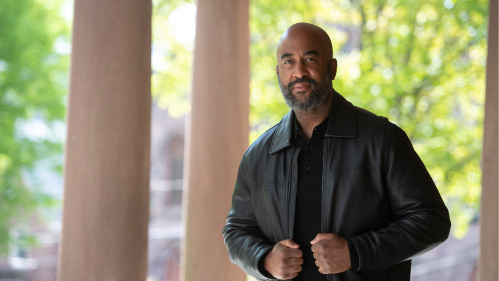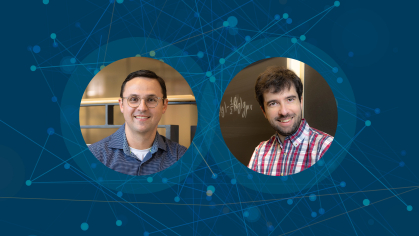Rutgers Philosophy Professor Elected to American Academy of Arts and Sciences

Derrick Darby writes and teaches about rights, inequality, education, identity and democracy
Growing up in Queensbridge, the country’s largest public housing project, Derrick Darby was surrounded by wannabe rappers and others in Long Island City, Queens, who dreamed of escaping poverty either through music or by becoming multi-million-dollar athletes. He knew as a young boy that neither was in the cards for him.
“What I was good at was asking questions and challenging the answers,” Darby said.
More than four decades later, the Henry Rutgers Distinguished Professor of Philosophy who studies the intersection of hip hop and politics and whose work focuses on social and political philosophy, was elected to the American Academy of Arts and Sciences.
Founded in 1780, its first members included Benjamin Franklin and George Washington and today lists President Barack Obama; Supreme Court Justice Sonya Sotomayor; actor Tom Hanks; actor, songwriter and producer Lin-Manuel Miranda; and others who have been recognized for their notable achievements in academia, industry, policy research and science. Darby joins 270 others from the United States and 23 countries chosen in 2023.
“Derrick Darby joins a remarkable group of scholars recognized for their excellence and leadership working across disciplines to address deep divides and to advance the common good,” President Jonathan Holloway said. “I am thrilled to see his outstanding work in the field of philosophy and in the classroom honored.”
Darby came to Rutgers in 2020 from the University of Michigan where he had been the first Black tenured philosophy professor. Being the first or only is not foreign to Darby. He was one of only a few Black or African American students in the Department of Philosophy and Religion at Colgate University where he received his bachelor of arts in philosophy. When he went on to the University of Pittsburgh, where he earned his Ph.D., he was the only Black graduate student in the graduate philosophy program, studying under an all-white faculty. According to the American Philosophy Association, only 7.2 percent of philosophy professors in the United States are Black.
“It was a tough time, really hard,” said Darby. “But I did really well and kept on going.”
Today Darby writes and teaches about rights, inequality, education, identity and democracy. He is finishing his fifth book, which also looks at the effect race and racism have on philosophical questions. He believes that antiracists, those who believe in identifying racism and eliminating it by changing the system, need to come together to devise what he calls big tent remedies to address both racial and economic injustices.
“These are very weighty topics,” Darby said. “We see injustices every day on the news that focus a lot of attention on the problem. What we need to do is put our collective energy into solutions to solve these problems.”
Darby has delivered this message to students in his classes. Two undergraduate courses, one on the philosophy of hip hop and the other on gun rights and gun control, have been some of his most popular with students.
In “Rhymes and Reasons: Hip Hop and Philosophy,” a School of Arts and Sciences signature course, Darby brings in artists such as Melle Mel and Rah Digga to talk to students. He describes skilled hip hop artists as “profound thinkers delivering important messages” that have raised the consciousness of young people who didn’t grow up in places like Queensbridge.
“I remember one young white male student who came up to me after one of these classes with a hip hop artist and said, ‘Professor Darby, I never had an experience like this in my life and never realized what this music offers.’ "Often as teachers we don’t get to see our impact that immediately,” Darby said. “So, as a teacher this touched me.”
Rutgers University-New Brunswick's Philosophy Department has been ranked second in the world by QS World University Rankings. Darby directs the university’s Summer Institute for Diversity in Philosophy, one of the oldest of its kind in the United States, which is designed to introduce undergraduate students from diverse backgrounds to the discipline, give them an idea of what graduate studies in philosophy will entail and what it means to be a professional philosopher.
He remembers, back in 1988, when he surprised his mother with the news that he wasn’t going to pursue a career in law but instead enter a doctoral program in philosophy. Darby had admired Supreme Court Justice Thurgood Marshall throughout his life and had told his mother over the years that he would go to law school because he wanted to be a Supreme Court judge.
“At the time, one of my professors told me that I needed to take this route because I was a good philosophy student and the discipline needed more Black folks,” he said. “It was hard for me to explain to my mother what philosophy was, but I told her it was going to be good for me.”
After being elected to the American Academy of Arts and Sciences, a former philosophy professor from Pittsburgh sent Darby a note congratulating him for being selected and excelling in a field that has not been one that has historically been accepting of people of color and women and calling it "the greatest academic honor" for a college professor.
“Getting that email from a former professor at Pittsburgh whose class I had taken so many years ago, almost brought tears to my eyes,” he said. “I know that I must keep doing what I’m doing and team up with others to solve some of our biggest challenges like inequality.”


